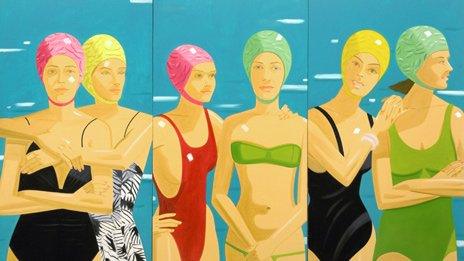Alex Katz: The art of optimism
- Published

At 85, Alex Katz is hailed by some as the most important painter in the US. But acclaim came relatively late in life, perhaps because his work doesn't fit convenient categories. An exhibition of his work has just opened at Turner Contemporary in Margate.
Asked to describe his work, Alex Katz often uses the word "optimistic" - probably uniquely among major contemporary artists.
"Even at art school I couldn't stand the idea that tragedy was good," he says.
"To me a painting has to be immediate and of the moment - that's its power - and the medium for the picture is light."
Light suffuses the paintings he's just spent a week hanging at Turner Contemporary in Margate in Kent. The show has transferred from Tate St Ives in Cornwall and consists of a selection of his works from the 1950s onward.
The seaside venues are appropriate. Few of the images feature rooms or closed spaces. You're more likely to encounter a stylised seascape or a beach with good-looking people on it.
The size varies from very small pieces to the huge canvasses 20 feet across, a style he began to explore in the 1990s.
Katz has been influenced by the smooth surfaces of advertising and by the bright images of movies. His is not a world of dark shadows. Sometimes people look for social commentary in Katz's work or a questioning of American values, but he insists there is none.
He has always mixed portraits and landscapes. His best-known recent portrait was of US Vogue's editor-in-chief Anna Wintour, an image which now hangs in the National Portrait Gallery in London.
The artist was born in Brooklyn in 1927. He spends most of the year in a large studio in SoHo in New York City, moving north each summer to Maine. After a 60-year career, he says he still works virtually every day.
I suggest to him that, for someone born and bred on the US East Coast, there's a particularly West Coast feel to his imagery... but Katz disagrees.
"Maine light is very different from California light. California is hazy and bright but up in Maine it gets very clear. That's why I moved there.
"Further south you get a lot of glare. And the light in Los Angeles is different again - sort of fuzzy and whiteish."
Katz was never taken by the trend for Abstract Expressionism which gripped the generation of American artists before him, such as Rothko and Pollock. Though his work sometimes hints at Pop Art, he says he finds the whole question of labels a distraction.
"The style of the paintings in inherent: It comes out of the sub-conscious.
"Labels are just a journalistic thing. Painting gets promoted on the basis of schools or types. It's a synthetic way of determining art. I think of my paintings as realistic and post-abstract."
He says his paintings can sometimes be produced very quickly, in some cases in as little as five hours. But each time, he starts with a very clear idea of where he's going. "I already have sketches and other paintings and there's a drawing on the canvas. The colours are pre-mixed and the brushes are even laid out for the strokes. It's all pre-planned."
"I paint very directly and the paint stays exactly the way I want it. But then the paint can take about three months to settle. The picture goes from shiny to apparently having no shine. In fact if you stand at an angle to the picture, you'll still see the shine."
Katz has a characteristically New York mixture of humour and bluntness. He isn't shy about identifying his influence in the work of artists such as Andy Warhol.
"But that was true even when I was in art school," he says. "People work off what I've done.
"Some artists produce great work but it's closed - there's nothing for other artists to pick up on. Mine seems to be open. Every 10 years, there's another crowd of people taking their cue from it."
Although Katz has made a highly successful career as a painter, and his work can be found in important collections around the world, he was in his 60s before he gained a reputation internationally.
Does he ever wish the big success - and big money - had come earlier?
"Not really: it's just the way the cookie crumbles. I concentrate on my work. These days it's mainly flowers."